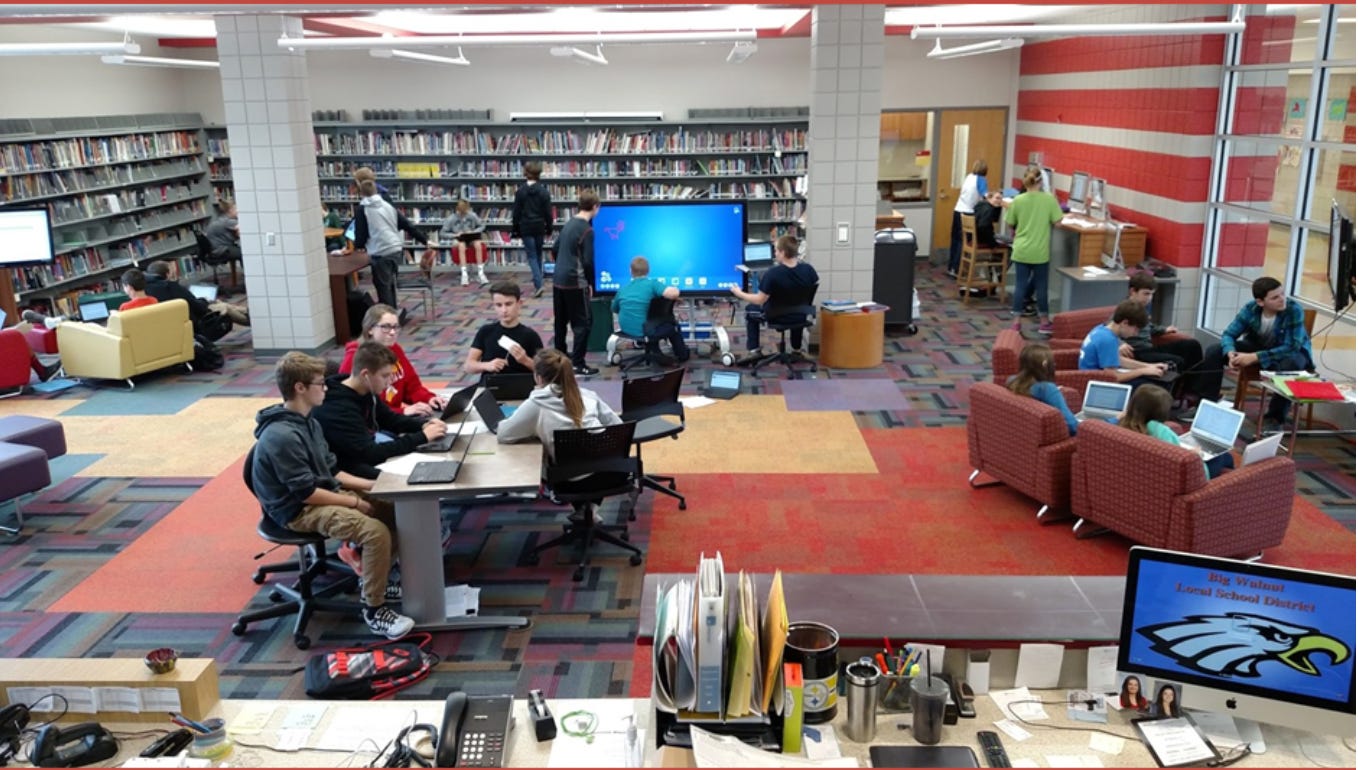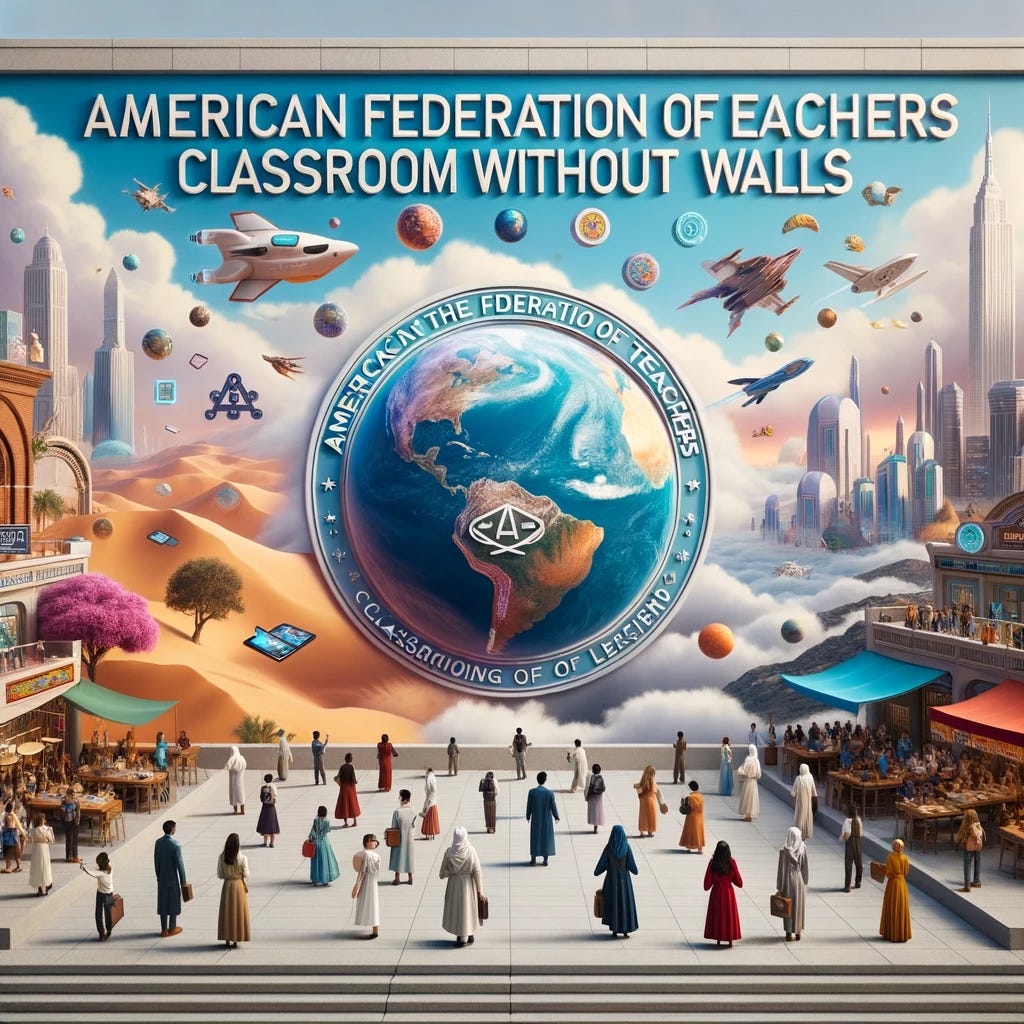How the American Federation for Teachers Could be a Positive force in an AI World
They need to support teachers learning to facilitate instruction in the emerging decentralized education networks. Suppressing them will not work.
Last week, I wrote critically about the AFT’s decision to promote the ChatGPT Zero writing detector.
As an individual decision, it makes little sense for multiple reasons:
1. There is overwhelming evidence that these detectors are not accurate and biased against students with more predictable writing skills, including ELL learners and special education students, undermining two of the core values the AFT claims to stand for: fairness and opportunity.
2. There is 100% consensus in industry that developing skills related to learning how to use these tools, including how to write with them, is critical to job success and employment. The only skills that rank higher on LinkedIn job descriptions are soft skills (soft skills #1; generative AI skills #2).
3. Some of what has been said by Randi Weingarten, the President of the AFT, to promote these writing detectors makes little sense: that putting student data into a writing detector increases privacy and cyber security, and that we have to prevent the harms of the next industrial revolution. Sorry, but these literally make no sense at all.
One professor was so shocked by the AFT’s decision that he asked in a group if there was a way we could contact the AFT to let them know about these problems. But all of these problems are too well known and obvious for them not to know this. They know. And as I pointed out in a post, they tried spinning or making up everything they could to justify this new program.
And I noted that it gets weirder: They are adding NewsBusters to the tools available for its members in order to reduce disinformation. This seemed even odder. But it’s actually not odd on the broad continuum. Educators, who have been able to increase the physical control of their buildings, and are now able to use AIs such as digital hall passes to reinforce that, have lost control of instruction, and they will continue to lose it. Students can now learn anything at any time from anywhere for little to no money. Teachers and the unions they represent want to regain control of instruction, or at least maintain what they have. And they want it back both because they believe they are teaching students the most important things in the best way and, like all of us, want to keep their jobs.
Decentralization of education clearly threatens the jobs of public educators. I’ll unpack this more in a future post, but we can already see this trend. Here are some of the highlights: lower daily public school attendance with many not returning post-pandemic; students attending online school (e.g. Stanford Online and others, including those paid for with public funds (cyber charters); micro-schools that have accredited classes; homeschooling supported by VR and related technologies; an ability for students to learn anything they want from companies like Judie.io (125 courses with no hallucination); Synthesis; Khamingo, etc. With 5 billion people in possession of 16 billion devices worldwide, there are plenty of “places” for students to learn.
This decentralization trend will continue as AIs develop greater and greater abilities to teach students, not just deliver content, and employers’ faith in formal education continues to decline. The internet struggled to replace teachers because students still needed a teacher. Now, dynamic, interactive AIs can fulfill these roles. These are the non-human bots students are engaging with all day (see Snap Chat’s bot and characer.ai, for example); the bots students are already choosing to engage with over the teacher.
This will only become magnified by systems such as learncard can certify competencies, which are becoming more and more important to industries that find students who are graduating from high school and university completely unprepared for the workforce, as there is too much emphasis on content relative to skills, or at least the lack of integration of the two. Employers do not care how many hours you’ve spent in school; they care about what competencies you have that they can benefit them. Many are even dropping college degree requirements.
Human teachers will be able to offer many things that AI teachers cannot (love, encouragement, moral guidance, and needed human social and emotional interventions), but AIs will be able to surpass most teachers in other areas (content knowledge (relative to AIs that have solved the hallucination issue and at least one has in teaching), 24/7 availability, ability to produce individual assignments, ability to adjust instruction to the individual rather than the group, etc.). Remember that they are already choosing to spend time with their AIs rather than their teachers.
So, yes, human teachers will start to compete with AIs for employment. This isn't because schools will decide to use AIs to teach students instead of human teachers; rather, enrollment will continue to decline as more families and individuals choose educational opportunities outside of the conventional public school structure.
And this will be magnified if educators continue to focus their roles on teaching content and managing and controlling information. AIs can do that, and they are really awesome at it. Given the amount of information AIs can learn and analyze in seconds, this problem for teachers will only grow. Hoping to retain your job by retaining control of the flow of information is a lost cause.
We’ve seen this rodeo before. We can remember back to the early 2000s when librarians fought hard against Wikipedia, arguing it was unreliable. Why? They both feared the loss of their own jobs and honestly believed that all of the “sanitized’ information in the library was accurate. Those battles raged for years, but nowadays, librarians monitor the comfortable spaces, and students sit on sofas with laptops engaged in their work and talking to friends. Librarians often provide instructions on how to research online. They support classroom teachers and students who are working and learning in the library.
__
As they attempt to position teachers as the purveyors and controllers of knowledge, the AFT's new programs are not surprising and may have support from their membership. Even flailing empires attempt to reassert control, often resulting in warfare.
The problem, of course, is that this will inevitably fail. The AFT made a huge bet on a control tool that doesn’t function properly, that the kids (at least the high SES kids) know how to defeat, and that they can pay another tool to defeat. This is a lost cause.
Second, ironically, it is actually undermining the employability of teachers over the long term. AI will be the death knell of the current structure of education, and we will see more and more of a shift to more decentralized and distributed models. It’s already happening, it’s preferred by students, and new surveillance-style policies (E-Hall pass) will drive more students from school (yes, we can use E-hall passes to make sure they don’t jule at school, but they’ll just stay at home and jule there), and it’s already being supported by an industry that needs students with more skills and demonstrated competencies.
The best alternative is to envision the best form of education in a decentralized model Think of a future classroom, where instead of a human teacher taking his or her students to the library, every “classroom” of the future operated in such a decentralized model.
And, of course, these classrooms will not always or only be exclusively physical; they may be hybrid or virtual in different ways.
They may include students from all over the world speaking in different languages.
Models such as these will evolve over the next few years, and the nuances of the role of the teacher will need to evolve over time, with considerable thought being put into that role, but education is moving in this direction.
We might think of these as connections among points (see “nodes” and “Connectivism” in Dr. Mairead Pratschke’s “Generativism” (this article acknowledges the current ambiguity related to the role of the teacher in this model)).
Fengchun Miao at UNESCO visualizes it this way.
You should also watch high school student Sebastian Rao’s articulation of this.
Teachers who are prepared to teach in the new model on the right will be the ones who remain employable in the future. Those who do not will either not be employable or will be stuck, slogging away in school with the remaining few students who are forced to remain in school in the traditional model on the left-hand side for any number of reasons.
The AFT could play a positive role by providing more than lip service to the idea of providing essential AI literacy training that teachers desperately need to work in an AI World and which is currently not being provided by most schools. They could use their intellectual capacity and resources to become actively involved in developing networked models such as those on the right. These models are inevitable, but if the AFT uses its resources and influence, it could impact the development models in a positive way and in a way that protects a strong role for its teachers and protects the interests of the students under the care of its members. Trying to trap education on the left-hand side will not only fail, but it will render its members unemployable and damage the needs of students in the AI World.
I hope the AFT chooses to help its teachers and students.
I made this, but I hope they support something along the lines of one of these models.
.











Thanks for the shout-out!
Brilliant piece, wonderfully argued.